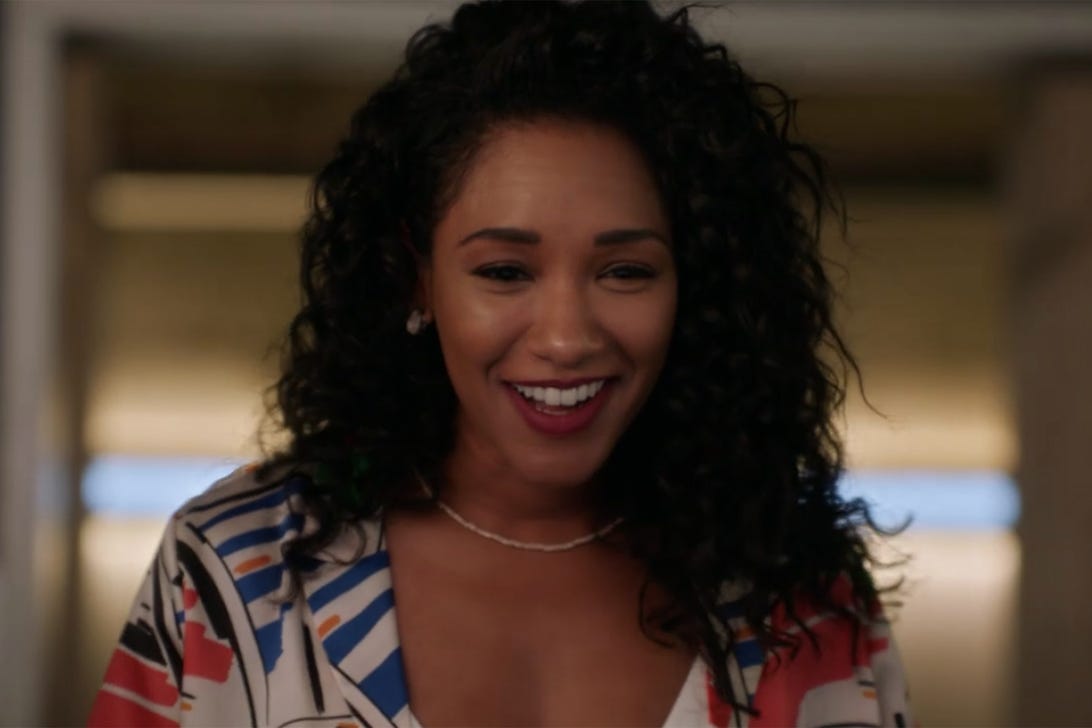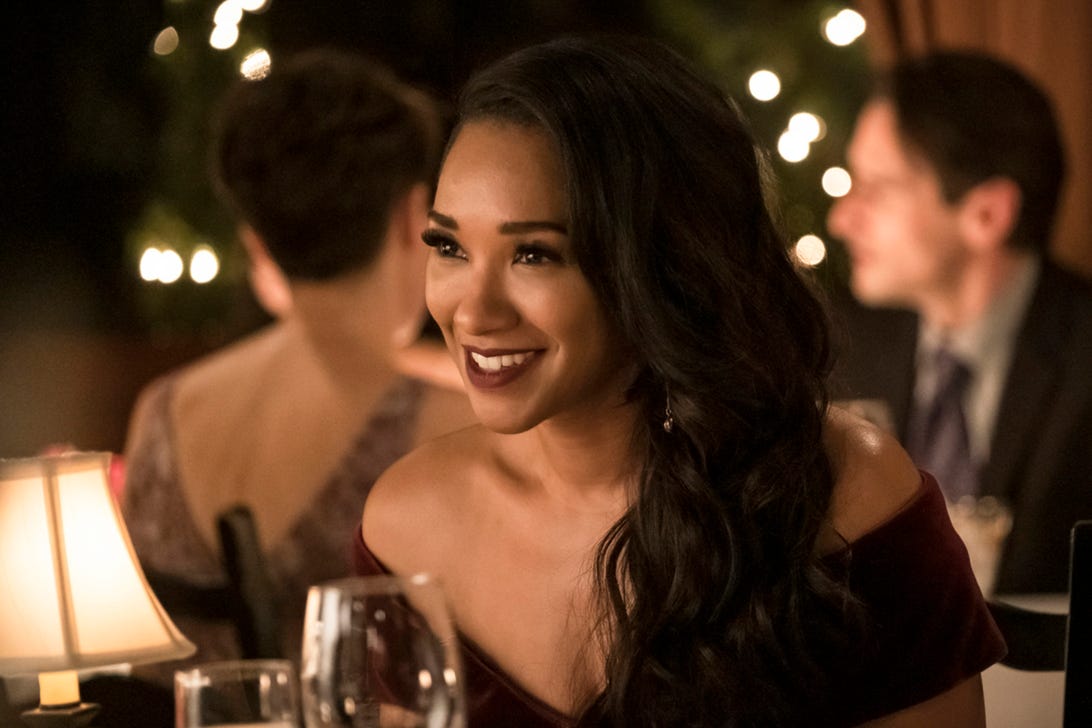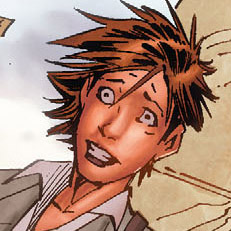*Iris West is(now)black in the comics and no one notices... wtf
*Iris West is(now)black in the comics and no one notices... wtf
*Iris West is(now)black in the comics and no one notices... wtf
Iris West is black in the comics and no one notices... wtf
The Flash's Iris West: 5 Things The Show Changed From The Comics (& 5 They Kept The Same)
Iris West is synonymous with the Flash in both DC's comics and the Arrowverse. What things about Iris did the TV show change or keep from the comics?
It's hard to imagine a Flash without an Iris West. A reporter for the Central City Picture News, Iris is as ingrained into the Flash mythos as Barry Allen, Wally West, and Jay Garrick. The love between Iris and Barry spans time and space as they have each returned from death and traveled through time to be together. Their love is one of the great romances in comics.
When The Flash was turned into a TV series spinning out of Arrow, changes to Iris were made. This isn't uncommon – a lot of things that work in comics may not work as well in live-action TV – and none of the changes have made Iris a lesser character, just a little different from the one readers have known over the decades. What things about Iris West were changed for the show? What things stayed the same?
10Changed: Race
The most obvious change to Iris from the comics to the TV series is her race. When Iris was introduced in the comics in 1956, the idea of making her Black would never have even been considered. For the Arrowverse series, the show's creators wanted to diversify the cast of characters and chose to make the West family Black.
The series has never put a focus on Iris's race, instead choosing to focus on the other aspects of the character. However, when Eric Wallace took over as the showrunner for season six, he and actress Candice Patton rightly wanted to bring in pieces of Iris's African-American heritage to better represent this version of Iris.
9Stayed The Same: She Is Barry's Partner
Iris West has rarely been shown as a damsel in distress in the comics. While Lois Lane was often in need of Superman's help, Iris tended to keep out of danger while still reporting on the events that happened in Central City. After learning that Barry Allen was Flash, Iris became his closest confidant, and that has never changed.
In the show. Iris does find herself in need of saving from time to time, but she is also there to save others when needed. She is the leader of Team Flash while running her own paper not because she is Barry's wife, but because she is smart and capable. Without her, there would be no Flash.
8Changed: Grew Up With Barry
In the comics, Barry Allen and Iris West met at a crime scene. Barry was there as the crime-scene investigator and Iris was there as a reporter. From there, a friendship grew and became a romance, turning into one of the greatest comic book love stories.
On the show, Barry and Iris grew up together when Iris's dad, Joe West, took Barry in after the murder of his mother and arrest of his father. This made the early days of Barry and Iris's romantic relationship a little weird, but true love can not be denied.
7Stayed The Same: Reporter
From the first time readers meet Iris, she is a reporter for the Central City Picture News. Her job as Central City's best reporter often put her in the same places as Flash, and Iris always got the interviews with the Fastest Man Alive. Just like the comics, Iris is a reporter on the Arrowverse series, starting off with a blog before becoming a professional reporter and then an Editor-In-Chief.
Iris's history as a reporter is as much a part of her character as her relationship with Barry Allen. To take it away from her would essentially break the character. While the show has struggled to give time to Iris's career, her investigative nature is always front and center.
6Changed: True Childhood
Like any long-running episodic story, comic books can get convoluted. Iris West may have started off as an average Central City citizen, but over the years, her true past was revealed. As it turned out, Iris was actually born a thousand years in the future and sent back in time by her parents and adopted by the Wests.
When she was killed by Reverse-Flash, Iris's real parents from the future captured her soul and brought it to their time where they placed it into a new body. For a time, Barry lived in the future with Iris, but his death during Crisis on Infinite Earths ended their happiness. On the Arrowverse series, at least so far, Iris is Joe West's birth daughter.
5Stayed The Same: Stylish
One thing that stood out about Barry Allen from the first time he appeared in Showcase #4 was how sleek and stylish his Flash costume was. What doesn't get talked about as often is how from her first appearance in the same issue, Iris West was also made to be fashionable. While other female characters in comics were still in pencil skirts and flowery hats, Iris was dressing like Audrey Hepburn.
The TV series has also had Iris stay up to date with the fashions of the day. Along with her stylish clothes, the series has recently started to let the character – and actress Candice Patton – show off her curls. The lives of everyone on Team Flash is crazy, but Iris makes it look good.
4Changed: Relationship With Wally West
Originally in the comics, Iris was Wally West's aunt. The sister of Wally's dad Rudy, Iris was the cool member of the family that lived in the big city and knew the Flash. After Flashpoint, a new Wally was introduced but was still Iris's nephew.
On the show, Iris and Wally are brother and sister, although they didn't grow up together. Wally was raised by their mother, who Iris believed was dead, which came as quite a big shock to Iris.
3Stayed The Same: Leader
When Iris returned from the future to get her grandson Bart the help he needed, she quickly became the matriarch of the Flash Family, and with good reason. Iris was someone the then-current Flash, Wally West, always loved and respected, and considering her life with Barry Allen, she had seen and done just about everything.
On the show, Iris runs Team Flash, having the full faith and respect of everyone in the gang. While Barry, Cisco, and Caitlin Snow are all geniuses in their chosen professions, it's Iris who has the strategic mind needed to win the day.
2Changed: Her Children
In the comics, Iris and Barry had twins, Don and Dawn, while living in the 31st century. The siblings inherited their father's super-speed and used it to become the heroes known as the Tornado Twins. Sadly, Don and Dawn died at the hands of the Dominators, but not before having children of their own. Don's son, Bart, would travel back to the current day with Iris and become Impulse. Dawn's daughter, XS, would become a member of the Legion of Superheroes.
In the show, XS was changed from being Iris and Barry's granddaughter to being their daughter who traveled back from the not too distant future to try and save her father's life. The show also changed XS's name from Jenni Ognats to Nora Allen.
1Stayed The Same: Family First
In both the comics and the show, Iris loves her family above all else and is always excited to see it grow. In the comics, she was the lifeline for the first Wally West and is now raising the second Wally – who goes by Wallace. She risked her life to bring her grandson back in time to keep him away from a government that kept him locked up and wanted to use him as a weapon.
On the show, after finding out that she had a brother, Iris did everything she could to make him feel welcomed into the home she and her dad Joe share. When Joe started dating Cecile, Iris couldn't have been happier for him. When Cecile announced her pregnancy, Iris was overjoyed. Every time a new person has joined Team Flash, Iris has been one of the first to make them feel like part of the family.
Candice Patton knew from the start that her casting in The Flash was going to get people talking. And she was right; when The CW announced that Patton, a Black actress, would play Iris West, who is canonically white and red-headed in the comics that inspired the TV show, the news was celebrated by fans of color and attacked by online trolls.

"I knew how important it was going to be for a lot of young girls who looked like me," Patton explained. "I knew it was different, I knew it was gonna be maybe a little bit controversial for some people, but I [also] knew it had the potential to be a conversation-starter and something really important."
What Patton didn't know was that it would take over five years before the show would begin to acknowledge her race.
The Rise of Black Superheroes: A Black History Month Celebration
Before Season 6, the show took a colorblind approach to its depiction of Patton's character, Iris -- and by extension, Iris' family -- painting her as a journalist, a love interest, and a daughter, but never embracing her identity as a Black woman. In fact, Iris and her police detective father, Joe West (Jesse L. Martin), could have been any race. And Iris mainly served as Barry Allen's (Grant Gustin) sidekick and "lightning rod," championing him from the sidelines while he saved the world on a weekly basis. As the seasons progressed, so did her character development and her relationship with Barry. However, Iris' blackness was never really acknowledged by the show or its characters, a glaring omission for fans who'd connected with the show's Black female lead.
But then, something changed in Season 6: The Flash hired its first Black showrunner.
When Todd Helbing stepped down from his post to focus on other projects in 2019, Eric Wallace, who'd served as an executive producer since Season 4, took the reins and reevaluated areas that weren't given enough attention. One that stood out to him like a neon sign was the way in which Iris and her family's race was ignored. Wallace understood who the Wests were as an African American family and didn't shy away from that. Season 6 opened on a cookout, a staple within the Black community, which featured recognizable dishes like creamed corn, candied yams, and collard greens. The scene stood in stark contrast to previous seasons, which raised eyebrows with dishes like Grandma Esther's ambiguous noodle recipe, a dish that seemed inauthentic and unlikely to have been passed down through a Black family.

Candice Patton, The Flash
The CWIn Episode 5 of the current season, Iris was again allowed to be a more authentic version of herself when she rocked her natural curls while heading on vacation with Barry. It was a small gesture that made a major impact and garnered resounding praise for showcasing Iris with a more relatable hairstyle instead of the wavy, perfectly placed side-part she'd been rocking for the previous five seasons. For Patton, who pitched the idea for Iris to ditch the flat iron for a more laid back look, this was a moment she previously thought to be impossible.
"Iris has a very specific look, and I think people were just used to seeing her in a certain way, and it didn't feel like there was a lot of opportunity for change, to [see me] with my natural hair," Patton said. "The thing about Black women, especially, is we have so many different hairstyles, and so, I think for a lot of people who see themselves in Iris, they were like, 'Why does she always have her hair straight and down and in this certain way? It's just not realistic. It'd be great to see her with, like, a hair bonnet on at night when she goes to sleep or her natural curly hair, and so I'm really glad we got to explore it one of the episodes."
Don Cheadle, David Ramsey, and More Stars Reflect on Their Black Superhero Roles
It's a small but important moment that offers much-needed visibility for African American women who are often judged by what lies on top of their heads. From twist outs to box braids, Black hair remains a topic of contention, and Black women and men today face discrimination in the workplace and in schools for the way their hair is styled. In 2017, the U.S. Army updated its policy to include a ban on dreadlocks. In 2019, a news reporter was fired for wearing her natural hair during an on-air segment. And in November, Gabrielle Union listed her hair, which was reportedly considered "too Black," as one of the reasons she was let go as a judge on America's Got Talent. The CROWN Act, which has already been passed in California, New York, New Jersey, and most recently, Colorado, offers protection against hair discrimination, and other states, like Minnesota, have begun following suit with similar laws. But these changes, while important, are still early steps in addressing an ongoing issue.
Wallace said that growing up surrounded by strong Black women, including his mother, grandmother, sister, and aunt, influenced his understanding of the significance of Iris sporting her natural hair, and he realized what that meant to young Black fans in a way that previous showrunners couldn't. He listened to his Black leading lady and just got it.
"I have always, from day one since I took over, encouraged Candice to tell me what you'd like to bring into the show from your own life, your own uniqueness as an African American woman, and let's do it because now that door is open," Wallace said.
Candice Patton, The Flash
Shane Harvey/The CWPatton noted that she had great experiences with The Flash's two previous showrunners, but added "it's different having a person of color who's running the show."
"I feel more comfortable bringing up concerns that I have, and I feel like those concerns are received and listened to a little differently," she said. "There's just a level of care and concern on my behalf which you don't always have from other showrunners, not because they don't care but just because I think it's hard for them to relate or understand or see why it's important to me as a Black woman."
Patton explained that having a Black showrunner who understood where she was coming from gave her a newfound safety net. Longstanding issues -- like the way in which her pigmented skin was lit during a scene or having access to artists equipped to style her hair and paint her face for the camera -- were finally being addressed on a more serious level, which is a rarity. Despite increased representation on television in recent years, there's still a dearth of stylists and makeup artists in Hollywood who know how to treat Black hair and Black skin. In contrast to their white counterparts, Black women still face an uphill battle when it comes to how they look on-camera, and are often forced to style themselves. In a 2018 Twitter thread, Nailed It! host Nicole Byer detailed her experience on a professional shoot in which a hairstylist was ill-equipped to style her textured wig, and the makeup artist didn't have dark enough pigments to contour her face. It's a huge problem that Patton doesn't read as malicious, but rather symptomatic of an industry-wide lack of education.
"I don't think anyone ever has ill intentions, but there is room for education in film and television, especially when it comes to actors of color and any actor who is a minority not often represented," she said. "There's just a learning curve that needs to happen, and so it's really important to have people in positions of power who are readily open to making those changes."
Backed by Wallace, Patton's role in The Flash now puts her in a position to foster some of that much-needed change in the industry, and it's a task the actress has taken to heart. She co-founded the lifestyle brand SheThority, which promotes self-love and leadership for young women, alongside fellow CW actress Caity Lotz in 2018.
It took years for Patton to reach this point of advocacy in her life. In 2014, there were just a handful of live-action superhero shows on television, including ABC's Agents of S.H.I.E.L.D., Fox's Gotham, and The CW's Arrow, none of which featured a Black heroine with comic book ties. (Gotham's Fish Mooney was an original character who served as an antagonist.) On the heels of Arrow's success, The CW took a huge swing with The Flash by casting a Black actress to portray Iris West. Though most fans were able to get past Gustin's dark-haired Barry Allen (he's blond in the comics), some outliers on Twitter threatened to boycott the series before it even aired. But Patton revealed she had anticipated the backlash. "I went into it having the expectation that, obviously, people were gonna be upset by it," she said. "Iris West is white and has red hair in the comics, and I am neither of those things."
Patton also recalled a warning she received right after she landed the career-changing role. "I remember our executive producer at the time saying, like, maybe sit offline for a couple of days, which I did," she recounted.

Candice Patton, The Flash
Katie Yu/The CWThough the initial wave of outrage has died down, there are still those who flock to Patton's social media with negative comments. But Patton said she is no longer fazed by them, and she isn't afraid to call them out. Her castmates have remained mostly silent through it all, but some have gradually begun to publicly come to her defense, including Gustin, who posted on Instagram ahead of Season 6, urging fans to accept Iris as Barry's endgame. But those criticisms speak to a minority stake of The Flash's passionate fanbase. Over the years, Patton's Iris has become one of The CW's most recognizable figures, garnering loyal support from fans who've latched on the charismatic and whip-smart journalist.
On-screen, Iris's role has changed drastically since The Flash's early days. Evolving from a damsel in distress of sorts to a Team Flash leader with her own successful website, Season 6 saw her gain a new sense of independence and finally set out on her own adventures. With help from Team Citizen -- her crew of smart, diverse women journalists including Kamilla Hwang (Victoria Park), Allegra Garcia (Kayla Compton), and consultant Cecile Horton (Danielle Nicolet) -- Iris has taken on a more active role and feels more integral to the plot than before. We're starting to see who Iris is outside of her marriage to Barry, and it's been a refreshing ride.
9 Black Superheroes Who Deserve Their Own Show
"Whenever we can, the intention is to pepper in what makes Iris West-Allen and not define her by her marriage to a man. I love marriage. It's great, but that's not how people should be defined," said Wallace. "One of the most important things for me when I took over as showrunner of The Flash was to really make sure that Iris Allen-West was an equal character with equal time and equal stories to her male counterpart, Barry Allen -- to establish equality, not just as a wife and a spouse. No, no, no. As a reporter, and as an individual with her own interests and her own stories, and, even more importantly, to show the independence of a working African American woman and bringing all of that out."
It's not surprising that the man who wrote Season 4's seminal Iris-centric episode "Run, Iris, Run" would position her so highly in the new season. The episode marks a turning point for Iris, who finally got to step into her own superhero suit. After inheriting Barry's powers, she was forced to learn to use her newly acquired super abilities to save Central City while Barry cheered from the sidelines. (His powers were eventually returned.) For once, Iris was the hero, and that thrilling moment was something Patton said she never expected.

Candice Patton, The Flash
Katie Yu/The CW"[I was] a little shocked because I remember very early on in the show, I'd asked [executive producer and The Flash comic book writer] Geoff Johns, 'Do you think I'll ever suit up?' and he was like, 'No, you'll never suit up.' So I kind of just laid that to rest, that I'd always be the human on the show. When they decided to do it in Season 4, I was shocked but also really excited just to kind of do something different, be more physical, be more active, be more of the hero on the show."
In retrospect, that memorable installment was a harbinger of the progress in store for her character. When Wallace, an avid comic book fan who loved Blade and The Swamp Thing, took up the showrunner mantle, he approached Season 6 as two different graphic novels, with the first part focused on a new villain and a five-part Arrowverse crossover event. Now, the second half of the season aims to put Iris in the spotlight in a way we haven't seen before. She's heading down an unexpected path as she tracks a lead on a story; after five years, The Flash is finally uncovering new layers of a character for whom it had only ever scratched the surface.
It's too early to determine what Iris West's legacy will be, but her influence is already being felt by the young girls who see themselves in the Flash heroine.
"Once I was on Twitter and watching the show with everyone and seeing young girls see themselves in Iris, seeing themselves as the ingenue and the lead female and the hero, it was really just an overwhelming feeling," Patton said. "There is no way to describe that sort of experience because at the end of the day, I'm just doing my job. I'm saying these lines and trying to do the best I can, and it's just icing on the cake that I've been able to be a part of something so iconic and inspiring to so many people across the globe."
It has taken six seasons, but we're finally starting to meet the real Iris West -- and that might be The Flash's most exciting adventure yet.
For Black History Month, TV Guide is celebrating Black superheroes in TV and film. As part of The Rise of Black Superheroes, we're honoring the legacies of pioneers like Luke Cage, War Machine, and actress Eartha Kitt; examining how blackness shapes the identities of characters like Iris West, Black Lightning, and John Diggle; exploring what today's Black heroes mean to kids of color; and celebrating the greatest Black superheroes of all time. You can check out more content from The Rise of Black Superheroes here.













No comments:
Post a Comment
Note: Only a member of this blog may post a comment.